
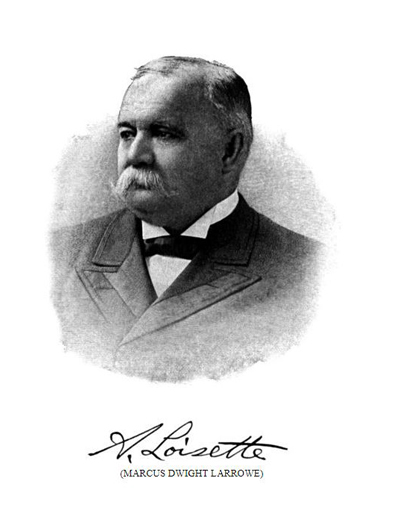
I have never found a skeleton in our collective closet but I have now found a scoundrel, my first cousin thrice removed or Great Grandma Daisy's cousin Marcus Dwight Larrowe aka Professor Alphonse Loisette. His first (or second) wife, Mrs. Nina Larowe is no less a character although not a scoundrel.
Marcus Dwight Larrowe was born May 5,1828 in Cohocton, New York, the son of John and Elizabeth (Holmes) Larrowe. John was one of 14 children born to our common ancester, Albertus Larrowe. Of the 14 children, three adopted the last name LaRue, our Daisy's father being one of them. Marcus had a sister and three brothers, one of whom became famous in his own right.
California became a state and Larrowe, age 21, is in New Haven, CT teaching at the "Young Ladies Collegiate Institute." The school, among other things, gave classes in Ancient and Modern History, Wood's Botany, Greek, Drawing, Painting and Vocal Music.
Kansas and Nebraska become territories and Larrowe, graduates from Yale with a law degree. The school catalog lists him as being from New York City.
The Pony Express begins and Lincoln is elected President and the Federal Census shows M.D. Larrowe, age 28, a lawyer living with a Mrs. M. D. Larrowe, age 22, born in Vermont. Larrowe has aged only 7 years in the last 10 and appears to have a wife. I can find no record of his either marrying or divorcing and this Mrs. Larrowe does not show up two years later in Nevada.
1864 - The Order of Masons was the first secret organization in Nevada, established in Carson County, May 15, 1862. The first group of officers included Marcus D. Larrowe, worshipful master.
1863 - Marcus was member of the first constitutional convention in Nevada. The constitution was overwhelmingly defeated, largely because the convention decided that voters should have the opportunity to vote on a constitution and officers at the same time. This was the convention which first brought Mark Twain into prominence as a humorist. He was a reporter for the "Territorial Enterprise" and was said to have written, "The prayer was dispensed with because no one listened to it anyway."
1864 - In January, the Nevada Union Convention at Carson City nominated M. D. Larrowe as a Nevada Supreme Court judge. At this same convention Orion Clemens is nominated for Secretary of State. Orion Clemens and his brother Samuel had come to Nevada in 1861 when the former was appointed secretary to the territorial governor of Nevada. Samuel, not having much luck prospecting for gold or silver and in need of money took a job as a reporter for the "Territorial Enterprise" and adopted the pen name, Mark Twain."
On August 16, 1864, at Lander County, Nevada Larrowe marries Nina Churchman Her age is not recorded but my best guess is that she is 16 years his junior, and was born in Dubuque, Iowa. In her autobiography she does not elaborate on her marriage except to say Larrowe died young. He enters the story making visits to her parents house which increase in frequency and, in her words, "ended as most such visits do, in a trip to the hymeneal alter.1" We are left wondering about the Mrs. M. D. Larrowe living in Ripon, WI in 1860.
In October, Nevada becomes a state and the list of Supreme Court justices does not include Larrowe.
In November, records do show that Larrowe was elected the state senator from Landry County as a member of the Union Party. He was absent from the 1866 Session and an election was held to fill the vacancy.
Note: The Union Party was the temporary name used by the Republican Party for the national ticket in 1864. It was used to attract voters who would not vote for the Republican party thinking Lincoln was incompetent and not electable. Lincoln won the election as a member of the Union Party, he and his vice-president who succeeded him are the only two National Union Presidents.
Larrowe's father, John, died on June 4, 1867. The homestead was left to Larrowe and his brother Albertus, the other sons and possibly the daughter had died, leaving just the two of them. Albertus bought out his brother and eventually built a mill on the property. He became the largest miller of buckwheat in the United States. The company expanded to Detroit, Michigan and beyond. The company was one of four companies that combined to become General Mills. Once when asked why he adopted the name Loisette he said it was because his father didn't approve of what he was doing although research shows that the professer wasn't "invented" until 1879 in England twelve years after his father's death.
On June 9, 1867, just five days later Nina Larrowe sails away on a 5 1/2 month journey, but more on that later in her section.
John D. Rockefeller forms the Standard Oil of Ohio company, William Lions of Connecticut invents an efficient can opener, 60 years after the tin can is invented and Larrowe, age 37 and Nina are enumerated in the 1870 census at 21 Bank Street in New York City, his occupation is listed as "literary library." Larrowe has aged appropriately between 1860 and 1870 but is still 5 years off the mark.
1874 - On Sept. 14, 1874 "The New York Daily Tribune" published the list of passengers departing New York for Liverpool aboard the steamship "Baltic," included among the passengers was M. D. Larrowe. Mrs. Larrowe is not listed so it is presumed they are no longer a couple.

1879 - Professer Loisette first appears in ad's in and around London. For a reasonable sum he will teach you French in one fourth the usual time.
1882 - The memory system first appears in ads. The professor is now giving classes, by correspondence or private classes. The Loisettian School of Physiological Memory teaches the Instantaneous Art of Never Forgetting, recommended by high Scientific Authority and promises any book whatever learned in one reading. Further, lost memories are restored, the worst made good, and the best better, a Cure of Mind-Wandering. Pupils of the Loisette system were sworn to secrecy, and charged the modern (2018) equivalent of about $120. to learn the "natural laws of memory" which the professer claimed to have discovered.
Ads appear all over the United Kingdom; Glasgow, Scotland; Dublin, Ireland; Belfast, Ireland; Cardiff, Wales, and everywhere in between.

1886 - Ads begin to appear in the United States. A search of newspapers finds ads from Vermont to California and Texas to the White Earth Reservation in Minnesota. The professor claims he is recommended by W.W. Astor and that he has given classes at Yale, U of Penn., Wellesley and Chautauqua University. At about this same time ads also begin appearing in Melbourne and Sydney, Australia. For the first time the ad mentions the number of lessons and a price and that one may take the classes, by post, in French or English, as the pupil prefers. The course consists of 5 lessons, a contract, promising not to reveal any idea of the system under a penalty is required. Terms (in 2018 dollars) $544 for a single pupil; for a class of ten or more, $109 each. Colonials were required to pay $20 extra for postage. The 4th course is entitled, "Instantaneous gordian knot" (a problem solveable only by bold action).
1887 - In about September of 1887 Robert Frederic Foster(1853-1945), a native of Edinburgh, Scotland and "connected with some of the best families in Great Britain" was hired to be Loisette's business manager. He spent 12 weeks reorganizing the entire business and in December started on the road to organize classes. It is said that Loisette's classes prior to Foster's hiring never exceeded two or three hundred, Foster "secured for his introductory lectures such as he had never before addressed, and his classes suddenly increased to more than a thousand."2
At around this time Mark Twain took the course, he and Larrowe had been aquainted while each was in Nevada. Twain was famously forgetful, the would lose his way in familiar neighborhoods, or fail to recognize pictures that had been hanging in his own home for years. In 1885 he stopped work on "Huckleberry Finn" and worked on his own system of memory aids. That year he patented "Mark Twain's Memory Builder: A game for Acquiring and Rataining All Sorts of Facts and Dates." The game was a failure and Twain returned to writing. Twain was so enthusiastic with the results that he furnished letters of recommendation that were reprinted by Loisette and distributed (example below) In addition all Loisette's ads now claimed to be endorsed by Twain.
;...I had no SYSTEM - and some sort of rational order of procedure is, of course, necessary to success in any study. Well, Loisette furnished me a system. I cannot undertake to say it is the best, or the worst, because I don't know what the other systems are. Loisette, among other cruelties, requires you to memorize a great long string of words that, haven't any apparent connection or meaning - there are perhaps 500 of these words, arranged in maniacal lines of 6 to 8 or 9 words in a line - 71 lines in all. Of course your first impulse is to resign, but at the end of three or four hours you find to your surprise that you've GOT them and can deliver them backward or forward without mistake or hesitation. Now, don't you see what a world of confidence that must necessarily breed? Confidence in a memory which before you wouldn't even venture to trust with the Latin motto of the U.S. lest it mislay it and the country suffer. Loisette doesn't make memories, he furnishes confidence in memories that already exist. Isn't that valuable? Indeed it is to me. Whenever hereafter I shall choose to pack away a thing properly in that refrigerator I sha'n't be bothered with the aforetime doubts; I shall know I'm going to find it sound and sweet when I go for it again.3
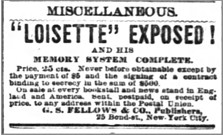
1888 - George S. Fellows publishes a book entitled "Loisette Exposed," oddly it contains the complete "Loisette System" claiming several reasons that Loisette does not own a copyright to the system. Fellows states the system is not original to Loisette but a Dr. Pick. Fellows further states he "has no interest in any Memory System whatsoever, and is actuated solely by that keen sense of justice and innate love of liberty, characteristic of every true American." Fellows feels if the system works it should be available to all, free of charge. From the preface of "Loisette Exposed," "The so-called Loisette System here presented, complete, has hitherto cost from FIVE to TWENTY-FIVE DOLLARS and the signing of a contract binding to secrecy in the penal sum of FIVE HUNDRED DOLLARS. If the system is worthless that fact should be made known. If it is all it claims to be, the whole world ought to have the benefit of it, and at last can have it, and at a price within the reach of millions. Here it is, and the intelligent public can judge for themselves."2
The book includes a section of "Testimonials of the Loisette System" including another glowing recommendation by Mark Twain at Hartford, March 4, 1887:
Dear Sir:
Prof. Loisette did not create a memory for me; no, nothing of the kind. And yet he did for me what amounted to the same thing, for he proved to me that I already had a memory, a thing that I was not aware of till then. I had before been able, like most people, to store up and lose things in the dark cellar of my memory; but he showed me how to light up the cellar. It is the difference, to change the figure, between having money where you can't collect it, and having it in your own pocket. The information cost me very little, yet I value it at a prodigious figure.
Truly yours,
S. L. Clemons2
In addition, sometime shortly before the book was published Loisette's business manager Foster had resigned. His terms of employment and his resignation letter are in the book. It details what a profitable venture Loisette had.
"Compensation was "20% of the total amount received from any class organized by Foster, after the expense of organizing the class have been deducted." The author cited as an example a 14 week period between Dec. 10, 1887 and March 14, 1888. Classes were held at Michigan University (400), Baltimore, MD (1087), Detroit, MI (1005), Philadelphia, PA (1500), and Washington D.C. (1100). " Estimating the average expense for each city at $500, we have $2,500 to deduct from $25,000, realized from 5,000 pupils at $5 each. Of this Loisette received about $18,000 and Foster $4,500, besides expenses. From this it would seem that a man must have strong reason for resigning a position that had paid him over $50 a day for more than fourteen weeks and for which he had a four years' contract. It might also be interesting to know what induced Loisette to release a man who was puttiing $1,300 a week into his pocket, which he had to travel only a few miles, and talk about four hours a week to earn."2
Note: the above numbers in 2018 dollars, rounded to the nearest dollar are: $133.00 entrance fee to the class, total before expenses $663,174.00, expenses of $66,317.00. Netting Foster $119,371.00 or $8527.00 a week and Loisette netting $447,485.00 or $8392.00 a week.
The author further states that upon meeting Foster he learned he was thoroughly ashamed of ever having any connection with Loisette. "Mr. Foster soon discovered that he himself knew a great deal more of the "marvellous" system of memory in its practical application than Loisette, who was as subject to mind-wandering and had as poor a memory as any of the mental wrecks whom he so vividly portrays as "mnemonical teachers." "Loisette Exposed" even went so far as to publish Foster's letter of resignation, written on April 25, 1888 at Baltimore, calling Loisette a humbug and a fraud.2
Prof. A. Loisette:
Dear Sir: I wish to say to you that for some time past I have felt considerable alarm regarding the character of the man I have been engaged in introducing to the public, and this uneasiness has just culminated in the information that he has paid over $1,000, either as damage or hush-money, in order to keep from the public a charge which I hoped, when I was first informed of woman who made it, he would stoutly deny and defend himself against. I have for some time been aware of rumors that he was living under a false name, and that the whole account of himself was a series of falsehoods and misrepresentations. I have also been at some pains to investigate his career from the time he was at Yale College to the time he was engaged at the Polytechnic in London, and the general result, coupled with my own experiences of him, has been such that I must decline, on moral grounds, to have anything further to do with him, as I do not propose to be caught in the branches when the tree falls. It has never yet been necessary for me to earn a livelihood by misrepresentations or fraud, and I decline to continue in any capacity which compels me to present and introduce to the public as a scholar, a gentleman, and a leader in the cause of education, one whom I know to be a humbug and a fraud.
Respectfully, R. F. Foster2
Note 1: I have a little trouble with this letter, in the first line is does sound as if it's addressed to someone i.e. "I wish to say to you....." but later we see, "..rumors that he was living under a false name..." and "I have been at some pains to investigate his career...."
Note 2: I have never seen anywhere else in print or otherwise regarding hush-money to a woman. $1,000 is today's money is roughly $26,500!
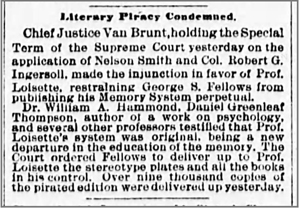
Loisette must have brough suit because on July 27, 1888 the New York Supreme Court ruled Prof. Loisette's system was original, being a new departure in the education of the memory. The court ordered Fellows to deliver up to Prof. Loisette the stereotype plates and all the books in his control.
Note: The book is readily availabe on Amazon.
Foster, upon resigning, joined another memory enhancement firm for a short while but then went on to publish, "Foster's Complete Hoyle" It was still being updated and reprinted as late as 1953. From 1895 - 1919 he was the card editor for the New York Sun, after which he went to the New York Tribune. He is an accepted expert on whist and duplicate bridge, having invented several of the conventions.
1889 - After the judgement against Foster, Loisette got right back to work. Although, after the scandal Mark Twain began to regret his association with the Professor and his system. He asked Loisette to stop using his name in advertising and to stop distributing pamphlets authored by Twain extolling the virtues of his system.
1891 - Loisette married Ida May Hough in Manhattan, he is 63 and she 37, although their marriage license gives ages of 60 and 38 respectively, in Ida's defense she married 2 days before her 38th birthday. Ida had applied for a passport the previous year, giving her year of birth as 1859 (thus age 30), she is described as 5' 3" with brown hair and eyes and a round face.
1893 - Ads begin appearing in Canada. For the most part ads in far flung places are for learning the system "by post." The Professor is still doing some lecturing including a stint in St. Paul, Minnesota where he gave both private and public lectures.
Ida M. Loisette, of New York City, applies for a passport. She gives her birth date as Aug. 25, 1853 (thus age 39) in Sunbury, Northumberland, PA.
The applicant is described as 39 years old, 5'4", brown mixed with gray hair, brown eyes and a rotund face.
Not only has Ida aged 9 years in two years time but has grown an inch as well.
1894 - Alphonse Loisette applies for a passport for himself, his wife and manservant. He gives his occupation as "memory educator." He is described as 62 years old, 5'9' in stature, with a high forehead, blue, brown eyes, straight nose, average mouth, round chin, grey and thin hair, florid complexion and full face. Unlike Ida who aged 9 years, Marcus appears to have taken 5 years off his real age.
1895 - Professor and Mesdames Loisette, according to the ship manifest, arrive in Sydney, Australia on August 11, having departed Auckland, New Zealand. Later it is said this was part of a lecture tour that included India, South Africa, and China in addition to Australia and New Zealand. At these places, the newspapers write, "he gave lectures and readings under the patronage of the most distinguished personages..."
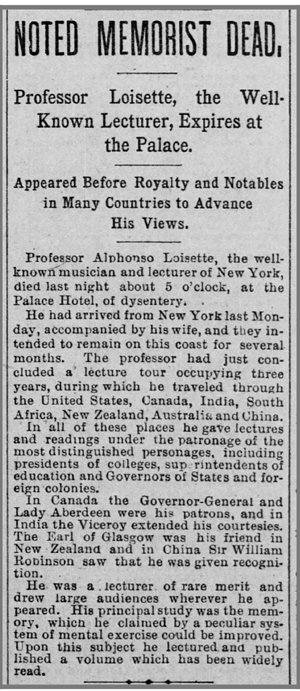
Feb. 5, 1896 - Professer Alphonse Loisette dies at the Palace Hotel in San Francisco of dysentery. Most of the articles I find say that he had just arrived in San Francisco from a years long tour, another specifically said he had been on a tour and was now coming to California, from New York, to ply his trade. It's not clear whether he docked in San Francisco or New York after his last tour.
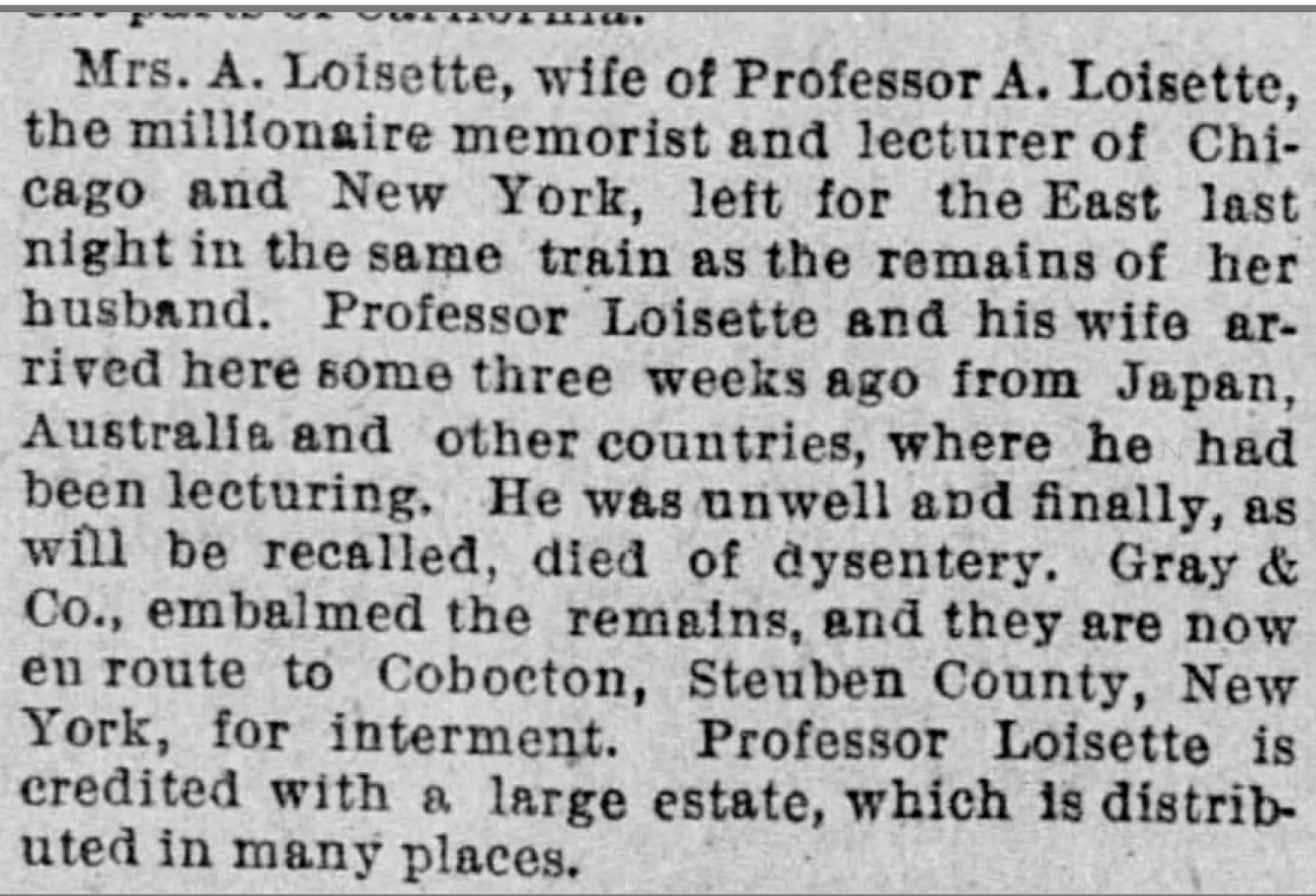
His wife accompanies the body back to Cohocton, New York where he is buried in the Larrowe Cemetery. His stone bears his birth name, Marcus D. Larrowe as well as his pseudonym Prof. A. Loisette. A photo of his gravestone is here.
Ida can be seen 5 months later returning from England, she had likely been there settling his estate as he is listed in the "England & Wales, National Probate Calendar." That same year she copyrighted a book containing his system under her name, Ida Larrowe-Loisette. It is a conglomeration of all his pamphlets and lessons. I recently purchased the volume for about $20., it's a slim thing, only 170 pages, published by the inimitable Funk & Wagnalls. The curious thing is that the spine of the book is blank, and the cover contains just a single word, Loisette. I find Ida again in 1910, as Ida Larrowe-Loisette, living in Washington, New Jersey and in 1940, as Ida Loisette, living with a niece in Detroit, MI. Ida died in 1953 and is buried beside her husband in Cohocton, New York. Her grave stone bears the name Professor Ida Loisette.
Back to top